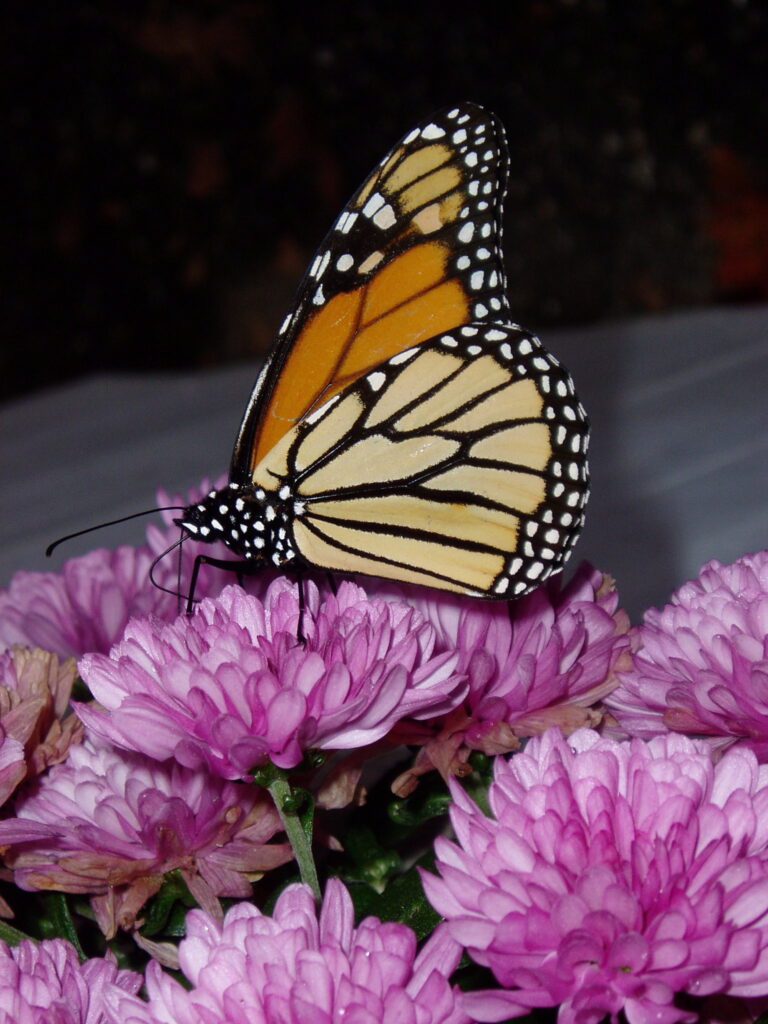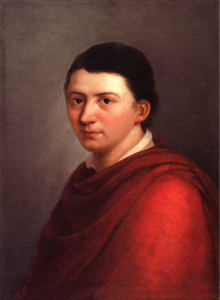The butterfly
(Poet's title: Der Schmetterling)
Set by Schubert:
D 633
[between 1820 and 1823]
Part of Schlegel: Abendröte (putative cycle)
Wie soll ich nicht tanzen,
Es macht keine Mühe,
Und reizende Farben
Schimmern hier im Grünen.
Immer schöner glänzen
Meine bunten Flügel,
Immer süßer hauchen
Alle kleinen Blüten.
Ich nasche die Blüten,
Ihr könnt sie nicht hüten.
Wie groß ist die Freude,
Sei’s spät oder frühe,
Leichtsinnig zu schweben
Über Tal und Hügel.
Wenn der Abend säuselt,
Seht ihr Wolken glühen;
Wenn die Lüfte golden,
Scheint die Wiese grüner.
Ich nasche die Blüten,
Ihr könnt sie nicht hüten.
Why should I not dance?
It does not cause any trouble
And there are attractive colours
Shimmering here in the greenery.
The more beautiful the glow
Of my bright wings,
The sweeter the breath
Of all the little blossoms.
I nibble at those blossoms;
You cannot protect them.
How great the joy is,
Be it late or early,
Hovering carefree
Over the valley and hill.
When the evening rustles
You see clouds glowing;
When the golden breezes
Make the meadows appear greener.
I nibble at those blossoms;
You cannot protect them.
All translations into English that appear on this website, unless otherwise stated, are by Malcolm Wren. You are free to use them on condition that you acknowledge Malcolm Wren as the translator and schubertsong.uk as the source. Unless otherwise stated, the comments and essays that appear after the texts and translations are by Malcolm Wren and are © Copyright.
☙
Themes and images in this text:
Breath and breathing Butterflies and moths Clouds Colour (general) Dancing Evening and the setting sun Fields and meadows Flowers Flying, soaring and gliding Gold Green Hills and mountains Joy Smells Sweetness Valleys Wings
Anyone would think the butterfly had been accused of something, such is the tone of self-justification and protestation. “I wasn’t doing any harm, but even if I was you can’t stop me!” seems to be the core of the message. He (and he most definitely is a wandering male) insists that there is an inevitability about his behaviour given the colours and the scents of the flowers and the intensity of the light, which is so much part of their allure. How could he not be attracted to such beauty? The blossoms are simply asking for it.
In this poem we only hear one voice, that of the entitled, polyamorous male. He does not care, and may not know, that his visits to the different blossoms to have a nibble at what is on offer (nectar) could in fact be helping the flowers, since the butterfly will inadvertently be collecting pollen and depositing it later in a different bloom. It may be that the flowers really ARE inviting these promiscuous visitors, but that is of no concern to the butterflies.

☙
Original Spelling Der Schmetterling. Wie soll ich nicht tanzen? Es macht keine Mühe, Und reizende Farben Schimmern hier im Grünen. Immer schöner glänzen Meine bunten Flügel, Immer süßer hauchen Alle kleinen Blüthen. Ich nasche die Blüthen; Ihr könnt sie nicht hüten. Wie groß ist die Freude, Sey's spät oder frühe, Leichtsinnig zu schweben Ueber Thal und Hügel. Wenn der Abend säuselt, Seht ihr Wolken glühen; Wenn die Lüfte golden, Scheint die Wiese grüner. Ich nasche die Blüthen, Ihr könnt sie nicht hüten.
Confirmed by Peter Rastl with Schubert’s source, Fridrich Schlegel’s Gedichte. Erster Theil. Neueste Auflage. Wien 1816. Bey B. Ph. Bauer. pages 23-24; with Musen–Almanach für das Jahr 1802. Herausgegeben von A. W. Schlegel und L. Tieck. Tübingen, in der Cotta’schen Buchhandlung, 1802, pages 140-141; and with Friedrich Schlegel’s sämmtliche Werke. Erster Band. Gedichte. Berlin, bei Julius Eduard Hitzig, 1809, page 19.
To see an early edition of the text, go to page 23 [31 von 190] here: http://digital.onb.ac.at/OnbViewer/viewer.faces?doc=ABO_%2BZ20491940X


